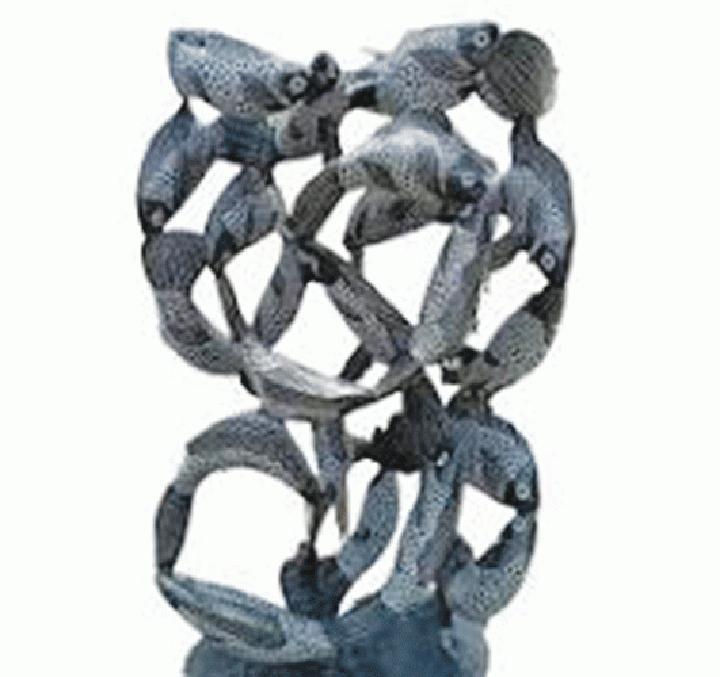Africa-Press – Zimbabwe. AN illustrious sculptor, Shepherd Deve has for many years produced stunning works of imagination through stone at Chitungwiza Arts Centre, where he is also a regular nominee for awards and sales on selected themes for curators and buyers.
His recent carving on slavery and mental oppression in the Cecil John Rhodes Oriel College Competition has won him a place in the top best 50 creative responses.
He is renowned for his intricate carvings of animals such as Koi fish, guinea fowls, and eagles, as well as abstract pieces and his work reflects a deep appreciation for nature and the human experience.
His sculptures have found homes in various international collections, including the residence of the Angolan ambassador to Zimbabwe.
Moreso his Love, Peace and Happiness monument is symbolic of his nostalgia over a peaceful and personal business one-year stay in China’s Hubei province, where he got to taste mouth-watering Koi fish meals.
“The Koi fish are emblems of unity, peace, love and happiness reflected in the Chinese people’s day-to-day lifestyles characterised by a communism of refined cultural traditions and norms where no one is left in degraded conditions and poverty,” Deve says.
“Koi fish teach us to unite and live as strong families. They eat together and show affection through kissing.”
He maintains that despite a horrible working experience on the hard green opal stone in the China’s Hubei province, he wishes to be given another chance to work and live in very inspirational places in China.
He was denied a work permit to engage into formal employment in universities and colleges because his numerous awards by the National Art gallery of Zimbabwe, Chitungwiza Arts Centre and other local and international galleries were not good enough, according to the Asians.
“When we do our work, we always make reference to the lessons we got from workshops and advice from colleagues,” Deve says.
“We have realised our dream and became winners of markets and awards. We wish if we could be fully considered as professionals in whatever deals that we wish to engage in.
“I did not take it lightly when I lost several opportunities because of lack of a formal qualification. May the responsible authorities look into this because the curators and collectors have never been very inquisitive on qualifications.”
Deve’s journey is a testament to the power of art as a vehicle for personal expression and cultural representation.
His advocacy for formal recognition underscores the importance of valuing and validating the skills of self-taught artists.
By addressing the systemic challenges they face, Zimbabwe can foster a more inclusive and globally competitive art community.
Deve’s story serves as both an inspiration and a call to action for the recognition and support of artists who contribute to the rich tapestry of Zimbabwe’s cultural heritage.
A year in China: Talent unrecognised
In 2017, Deve embarked on a year-long tour of China, aiming to expand his artistic horizons and engage with international markets.
However, his journey was marred by bureaucratic challenges.
Despite his accolades and recognition as an artist and social entrepreneur, the Chinese authorities denied him a work permit, citing the absence of formal professional qualifications.
This experience underscored a significant gap in the global recognition of self-taught artists and highlighted the need for institutional acknowledgment of their expertise.
Advocating for formal recognition
In response to his experiences, Deve has become a vocal advocate for the formal recognition of artists’ qualifications.
He proposes the establishment of an in-service programme, developed collaboratively by colleges and the National Arts Gallery of Zimbabwe, to grant formal qualifications to artists.
Such a program would not only validate the skills of artists but also enhance their credibility on the international stage.
Overcoming personal and professional challenges
Deve’s journey has not been without its hardships.
In addition to the challenges faced abroad, he has encountered personal setbacks, including a severe head injury resulting from a robbery attack.
Professionally, he grapples with the lack of access to electric precision tools and adequate capital for purchasing machinery, which hinders his ability to scale his craft and explore new artistic avenues.
Despite these obstacles, Deve remains committed to his art and continues to inspire through his resilience and dedication.
A call for institutional support
Deve’s experiences highlight a broader issue within the Zimbabwean art community: the need for institutional support and recognition.
While Chitungwiza Arts Centre has played a pivotal role in nurturing talent, with over 400 artists now part of its community, there remains a pressing need for formal educational pathways that can provide artists with the qualifications necessary to compete globally.
By implementing structured programmes that offer formal qualifications, Zimbabwe can empower its artists to achieve greater recognition and success on the international stage.
For More News And Analysis About Zimbabwe Follow Africa-Press






